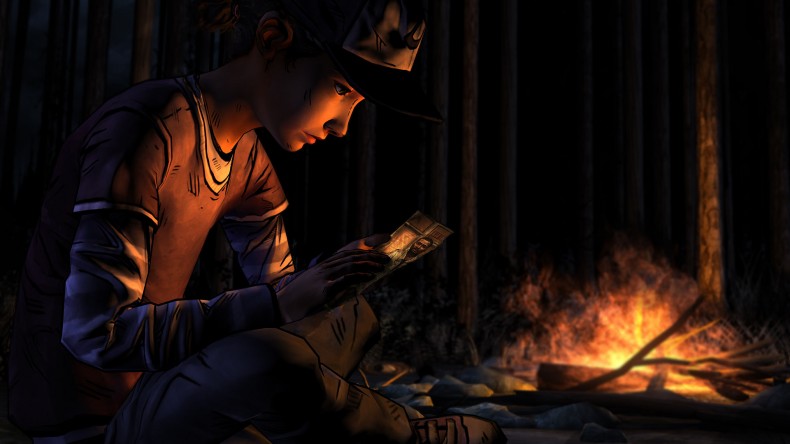The Walking Dead Season 2: All That Remains Review

Another awesome entry in TTG's TWD series, carrying on where Lee left off as Clementine takes on the walker-fighting mantle. A little scary, a lot emotional.
A little slow, a little short.
Pick up the whole season pass-- if Season 1 means anything, Season 2 will be an emotional doozy.
Waking the Dead
TellTale Games returns with season 2 of the superlative The Walking Dead game, shaking its choice-based moneymaker for all that it’s worth. It’s an emotional, occasionally scary, occasionally slow entry in what will likely be an exciting season.
Story
You begin the story as Clementine, the young girl The Walking Dead Season 1’s player-character Lee found and then sought to protect as best he could throughout the course of the season. She’s a little older (though barely), a little tougher, perhaps a little wiser, and she’s joined up with Omid and a very pregnant Christa (all that speculation apparently dead-on), but for various reasons she finds herself alone in the woods, looking for food, shelter, and the general accoutrements of the zombie apocalypse. It’s best to avoid any spoilers at all for a game like this, but as you can imagine, she soon finds other people, trouble, and— walkers.
It carries on the themes from the first season (and its namesake, Robert Kirkman’s graphic novels): people are sort of awful, though occasionally kind, and that they are the true threat in a zombie apocalypse, not the zombies themselves.
If you’re looking for return characters from Season 1, it’s probably best to remind yourself that most of them are dead (spoiler alert?)— this story is now Clementine’s.

The game can be started from a previous save file, whether you’ve played through TWD Season 1 and/or the 400 Days DLC. If not, the game warns you, it will randomly choose for you. I’ll be honest, I meant to replay Season 1 before I began Season 2 and never got to it, but the game will helpfully review your major choices for you in a dramatic PREVIOUSLY ON cutscene— at least the ones that seem to immediately impact your particular play through.
Gameplay
At its heart, The Walking Dead is an interactive story, which is not to be confused with not being a game. It retains the elements of TellTale’s LucasArts background— the gathering of items to occasionally combine them, but it’s mostly about the way people communicate with each other, the silences in conversations, and the things people do and do not say. TTG games are also about choice, and the familiar text box in the top corner stays the same, though it’s still often hard to tell what will have resonance and what won’t, and even a subtle, “She’ll remember that,†in the corner might mean very little game-wise except to taunt your conscience. TTG has made very few changes to the gameplay of the first season, with a few notable examples: in some combat sequences there’s now a massive red arrow to prompt you to move quickly in one direction or another (Quantic Dream-style). It’s slightly exhilarating and not an unwelcome change to the first game. The occasional quicktime events are there too, but except for moments when you’re like me and the E-key is suddenly elusive, none of these are distracting or even all that notable. The map is a little clunky in terms of moving around (like you’ll want to know why that particular patch of grass is so box-shaped and why you can’t angle your way around it), but nobody’s coming to this game for parkour.
Graphics & Sound
It looks great and it sounds great, and it’s really the superb voice acting that makes TellTale’s dialogue sing. Melissa Hutchison returns as Clementine, and she’s suitably older and harder-sounding. (As a side note, she’s also an incredibly awesome person, so if you see (stalk?) her like I might have done at Dragon Con 2013, try to stop and say hi to her.) The rest of the cast is great too and goes a long way in selling the fact that while people in a zombie apocalypse might be awful, they’re still people. The graphics echo the ones in Kirkman’s graphic novels, but the game seems to draw inspiration from those rather than using them as a guide.
Issues
So, look, it’s hard for me to find fault with a TellTale game. If anything, and this is nitpicky, it’s that the transition from Lee to Clementine as a player character doesn’t feel completely organic. If you played the first season, you’re trained, conditioned, to protect Clementine from the things around her, so transitioning to making her decisions for her can feel at times a little forced. Her dialogue occasionally waivers between stoic and bratty, neither of which carry the same emotional resonance as they did when an 8-year-old looks up at you, a convicted killer, and offers you her trust. That said, the weaknesses in “All That Remains†are only evident when compared to the episodes that preceded it. TTG’s writing is, as always, superlative, and it’s likely not wishful thinking that Season 2 will reach the emotional crescendo its predecessor did. It took the TV show all freaking season 2 to figure out where Sophia was, didn’t it?

A friend of mine texted me the night this came out and said, “I’m really worried about the dog,†and to some degree I wasn’t. I knew what was going to happen to the dog, and you will too— because it’s that kind of a game, and TTG wants to pull all of those heartstrings in the right and wrong places. It will feel occasionally obvious, but don’t worry, there’s probably something worse around the next corner.
It also relies incredibly heavily on some of the goodwill the first season bought; the emotional resonance of very early scenes depended upon caring about a couple of characters from the previous season. I, for one, was devastated when the kind of thing that happens in a zombie apocalypse happens (people die), but my cynical dog-minded friend up there couldn’t have cared less. It also really relies on your willingness and desire to take Clementine into your own hands, literally. You’re probably okay if you haven’t played season 2, but it’s probably a little like coming into season 2 of a tense dramatic TV show– there are simply going to be emotional beats you won’t get.
So, see? Nitpicky. The Walking Dead is a superlative game, though likely it will be greater than the sum of its parts— in the end.
Notable Extras
The biggest, and smartest thing, that TellTale has done for its games, beginning with The Walking Dead Season 1 and continuing in their Fables adaptation, The Wolf Among Us, is provide a breakdown of the choices that you make versus what everyone else has made. This has the fascinating outcome of almost forcing you into wanting to play again. And you will— because the stark numbers of what you did and did not choose have the startling effect of emphasizing how easy it would have been to make the other choice…and how many other people did. (As a side note, at GDC2013 TellTale’s former writers Sean Vanaman and Jake Rodkin talked about the choice of Doug Vs. Carley from TWD Season 1. 75% of people saved one, 25% of people saved the other— a problem, in TTG’s minds. So they sought to create environments in which the choices were more evenly split, showing a true divide in player consensus. Those choices seem less polarizing in “All That Remainsâ€, but it’s still fun to see.)

SpawnFirst Recommends …
Yeah, I mean, absolutely. Pick up the season pass while you’re at it. These are games that reward patience and replays, and their longevity is significant. “All That Remains†will feel a little like a prologue or a mid-season teaser for a show you’ve been waiting for a long time to come back on. Let’s hope TTG gets episode 2 out soon. And in the meantime? You can explore all those other choices you didn’t make.










